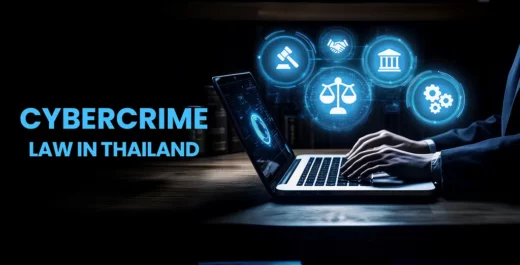In April 2025, Thailand strengthened its cybercrime laws to combat rising digital scams and improve online safety for both locals and foreigners alike. These new measures come in response to rising public concern over financial fraud, identity theft, and other fast-evolving cyber threats impacting individuals and businesses across the country.
Here’s what you need to know about these recent changes to Thailand’s scam laws and how they might impact you.
Key Changes to Cybercrime and Scam Laws
The new amendment, formally called the Emergency Decree on Measures for the Prevention and Suppression of Technological Crimes (No. 2) B.E. 2568 (2025), introduces stronger measures to prevent scams, speed up enforcement, and improve compensation for victims.
There are four key changes:
- Harsher Penalties for Mule Accounts: Individuals who open, sell, or lease bank accounts for use in scams and money laundering (“mule accounts”) face significantly increased fines and prison terms. The updated law aims to hold both scammers and financial institutions accountable for fraudulent accounts and transactions.
- Mandatory SMS Screening and Blocking: Since scammers often use text messages to reach victims, mobile operators and telecom providers must now deploy real-time filters to detect and block SMS messages tied to scam activity.
- Fast-Track Freezing and Restitution: The Anti-Money Laundering Office (AMLO) now has the power to freeze suspicious accounts immediately upon report and directly return recovered funds to victims without waiting for a court order, allowing victims to recover stolen funds in days rather than months.
- Joint Liability for Cybersecurity Failures: Banks, telecom providers, and online platforms that fail to meet government-mandated cybersecurity standards, including protecting personal data, or refuse to cooperate with official investigations, may be held jointly liable for victims’ losses, with possible compensation of up to 500,000 THB per case.
Types of Online Scams Targeted by the New Law
The law targets a broad range of online scams that have resulted in major financial losses across Thailand. Common cybercrimes covered under the decree include:
- Email & SMS Phishing: Scam messages promising fake prizes or job offers that direct you to fraudulent websites designed to steal your login credentials, credit card details, and other personal information
- E-Commerce Fraud: Fake online stores or sellers who take your payment but never deliver or send you counterfeit items instead
- Romance Scams: Emotional scams that exploit romantic connections in order to manipulate victims into sending money
- Investment Schemes: Too-good-to-be-true investment opportunities that promise high returns but use new investors’ funds to pay earlier participants until the scheme collapses, e.g., pyramid and Ponzi schemes
- Call-Center Scams (Vishing & Phishing): Criminals posing as bank or government officials over the phone to pressure you into divulging sensitive information or authorizing transfers
Steps to Take If You’ve Been Scammed in Thailand
If you’ve fallen victim to a scam, the new law makes it easier to recover your losses and gives you stronger legal tools to fight back. Here’s what to do:
- Freeze Your Accounts: Contact your bank immediately to suspend any compromised accounts.
- Report the Scam: Contact the national cybercrime hotline at 1441 to notify authorities of the scam.
- Report to the Police: File a police report in person or online at www.thaipoliceonline.com.
- Recover Funds through AMLO: Submit your complaint to AMLO with all required documents, including the form, transfer receipts, supporting evidence, and a copy of your ID. AMLO will review your submission and issue a decision within 7 days.
- Pursue Compensation for Institutional Negligence: If AMLO is unable to recover all of your funds, you may initiate a claim against the banks, telecom operators, or online platforms that failed to comply with mandated cybersecurity standards (for example, inadequate firewalls, data encryption, or incident-reporting systems).
- Seek Legal Advice: Consult with a bilingual lawyer in Thailand specializing in fraud cases. They can provide guidance on your options for legal recourse and help you take action against the scammer or institution that failed to protect you.
Siam Legal International is a full-service law firm with over 22 years of experience in Thai law. Our expert fraud advisors are fluent in Thai and English and understand the financial and emotional impact of falling victim to a scam.
We offer personalized guidance to help you recover, explain your rights, and support you throughout the legal process. If necessary, we will represent you in court to hold the scammer accountable and help you reclaim your funds. To learn more about how we can assist you, contact Siam Legal today.

Leave a Comment